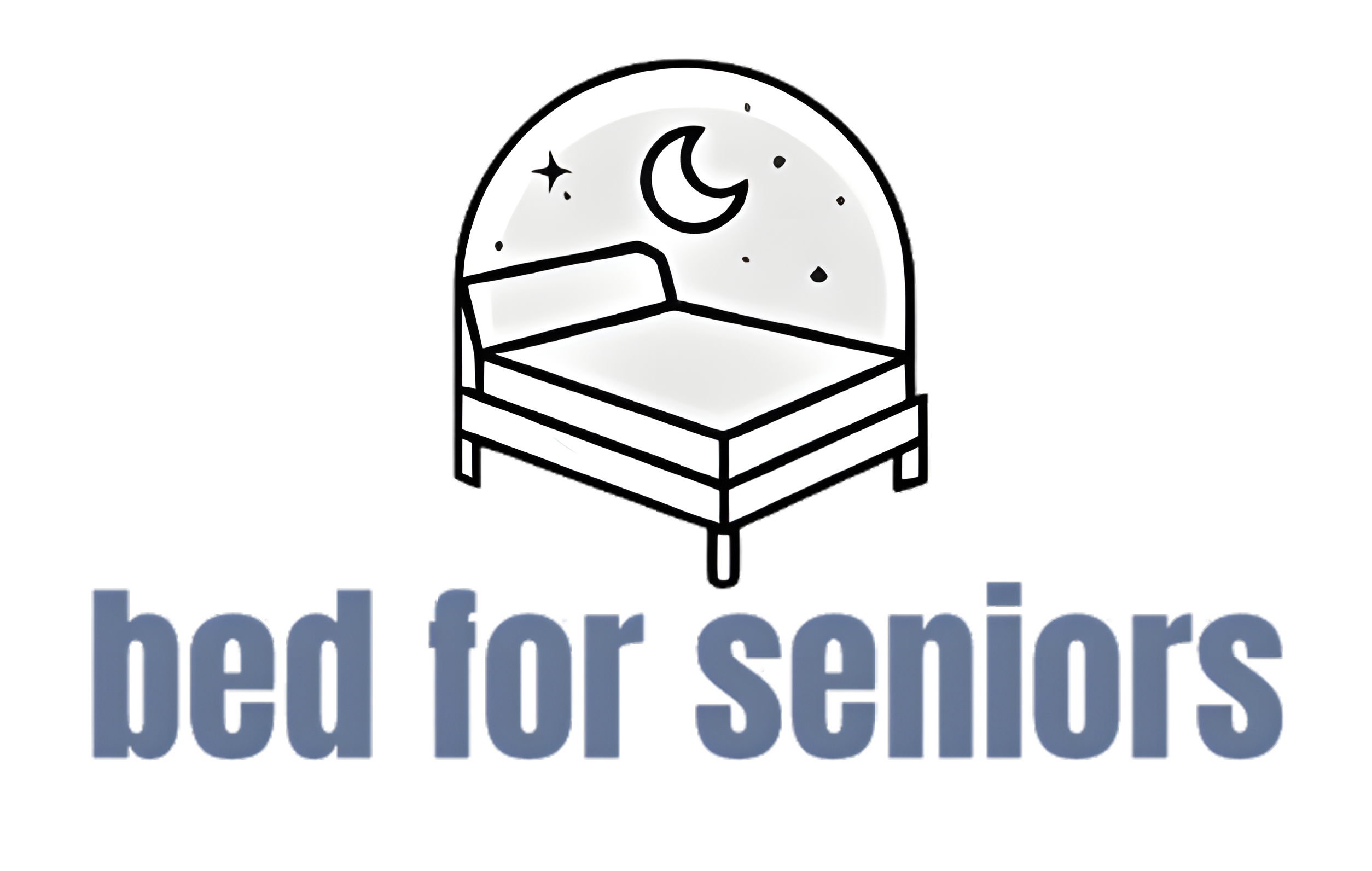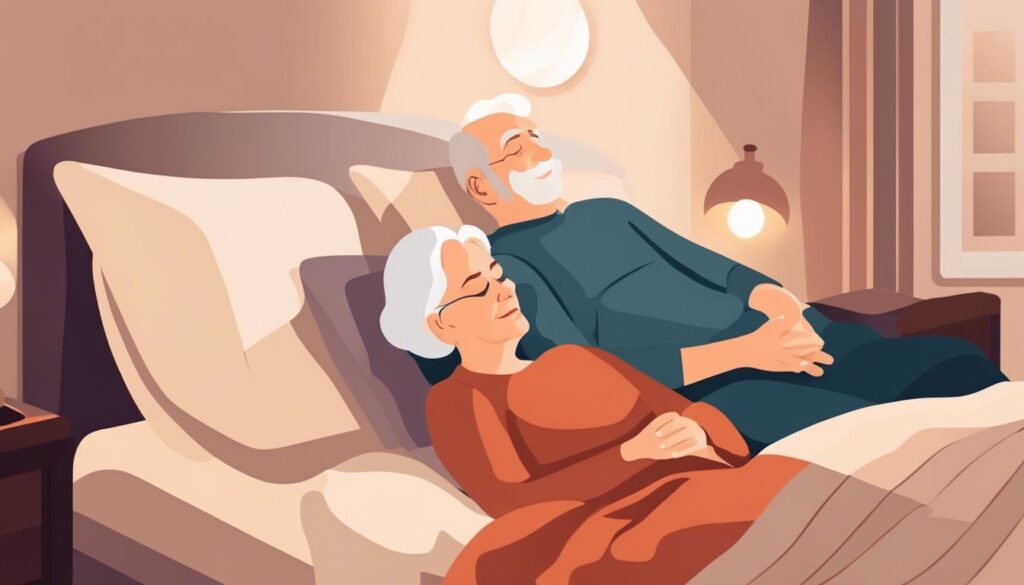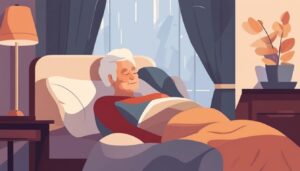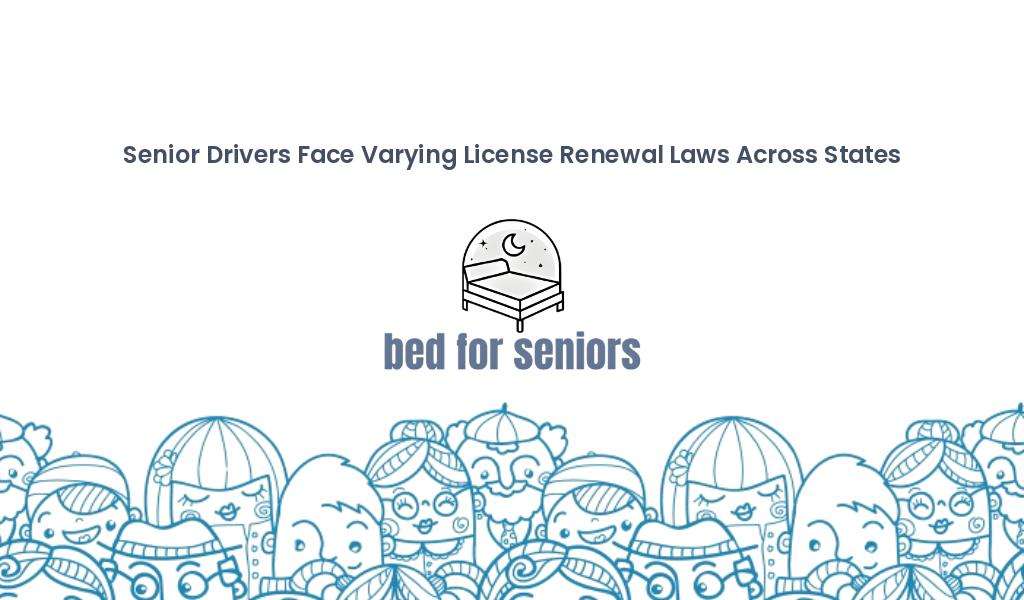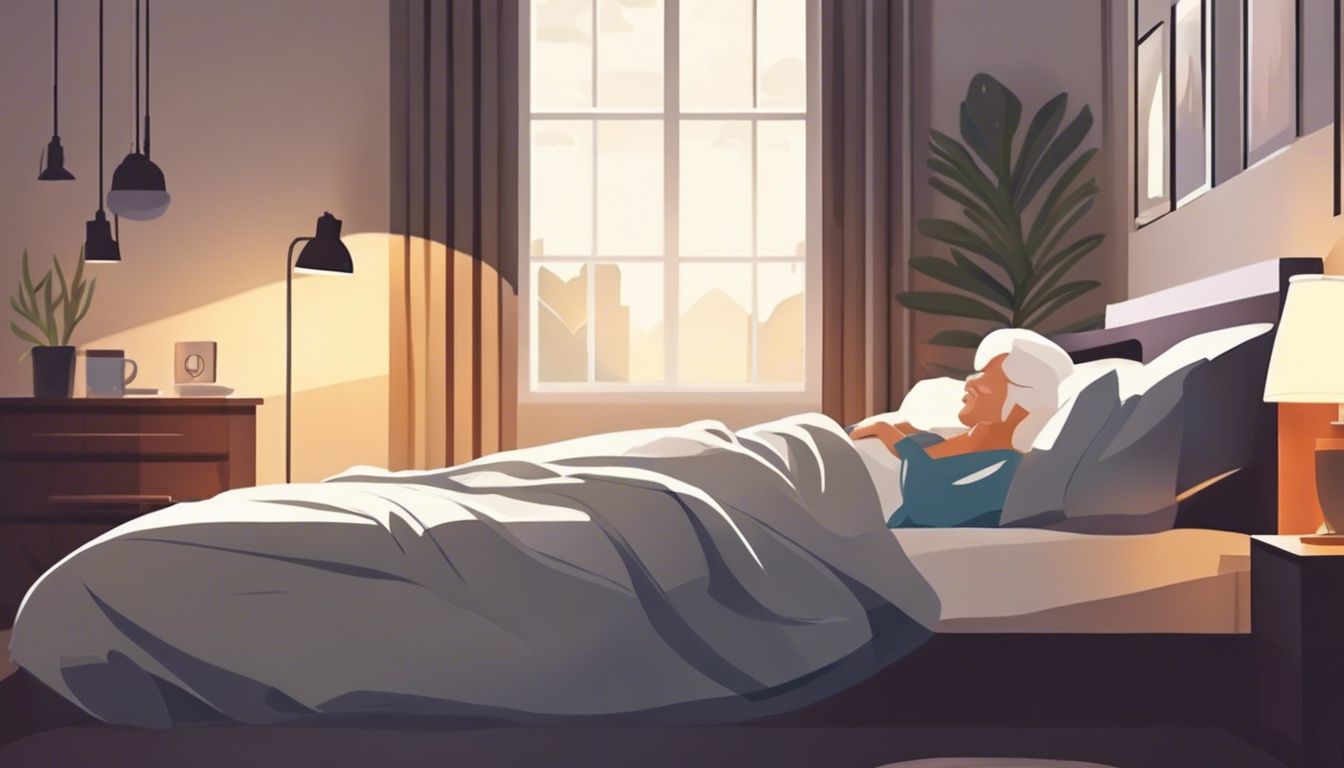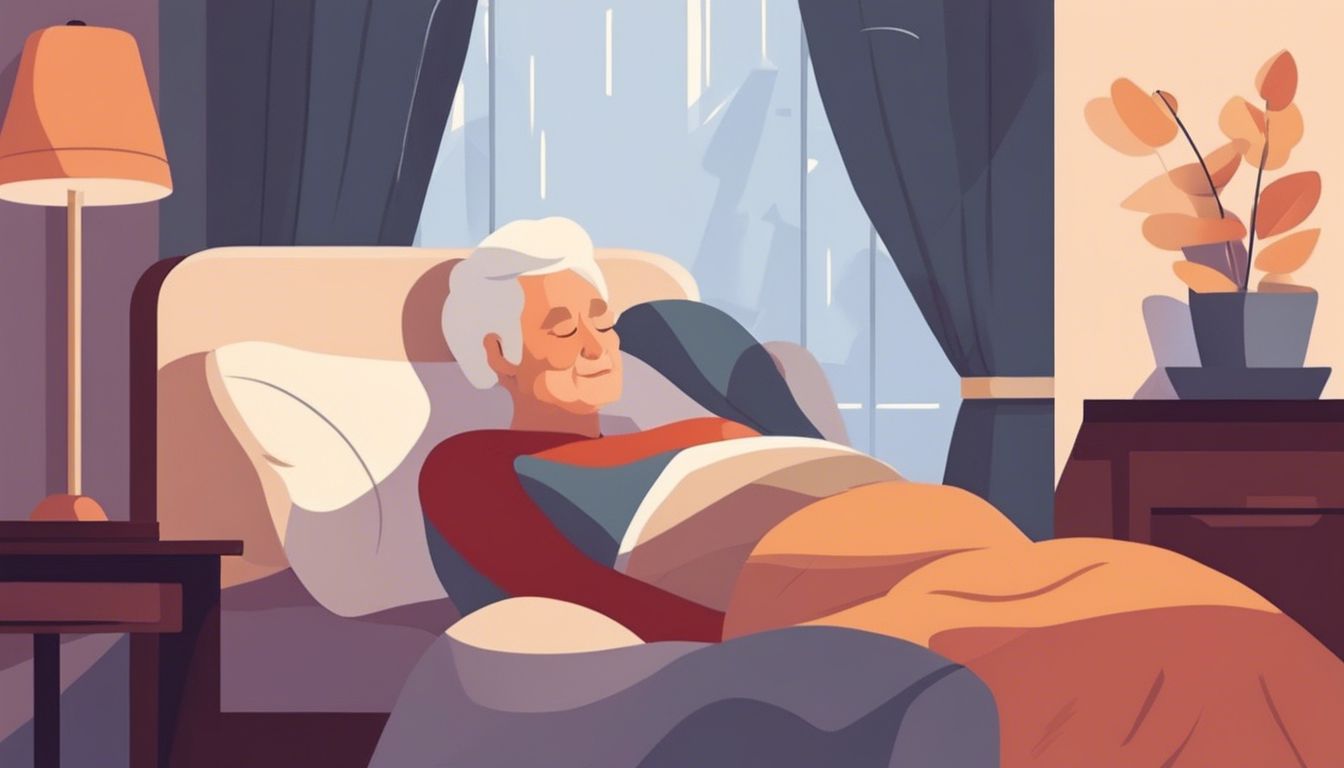Many seniors struggle with poor sleep quality, affecting their overall health and well-being. Sleep problems in older adults can lead to depression, memory issues, and increased health risks.
This article explores how sleep impacts senior health and offers practical strategies for improvement. Discover effective ways to enhance your sleep and boost your vitality.
📋✅
- Poor sleep in seniors increases risks of heart disease, diabetes, obesity, and weakens the immune system.
- Common sleep issues for older adults include insomnia, frequent waking, sleep apnea, and movement disorders like restless legs syndrome.
- Seniors can improve sleep by sticking to a regular sleep schedule, creating a dark and cool bedroom, exercising earlier in the day, and managing stress through relaxation techniques.
- Preventive health screenings like blood pressure and cholesterol tests help seniors detect issues early, but some carry risks that should be discussed with a doctor.
- Persistent sleep problems, loud snoring, breathing pauses during sleep, or severe daytime fatigue are signs seniors should consult a healthcare provider for professional help.
Impact of Sleep Quality on Senior Health
Sleep quality affects seniors’ physical and mental well-being. Poor sleep can lead to health issues and cognitive decline in older adults.
Physical health effects
Insufficient sleep drastically impacts seniors’ physical health. Poor sleep quality increases the risk of cardiovascular disease, diabetes, and obesity in older adults. It weakens the immune system, leaving seniors more susceptible to infections and illnesses.
Lack of proper rest also slows down cell repair processes, accelerating the aging of tissues and organs.
Good sleep habits significantly benefit senior health. Adequate rest allows the body to repair cell damage and refresh immune defenses. It helps regulate blood pressure, reducing the risk of heart problems.
Quality sleep also aids in maintaining a healthy weight and managing blood sugar levels. Proper rest enhances cognitive function, improving memory and decision-making abilities in older adults.
Sleep is the golden chain that ties health and our bodies together. – Thomas Dekker
Mental health consequences
Sleep quality directly impacts seniors’ mental health. Poor sleep patterns increase the risk of depression, anxiety, and cognitive decline. Chronic sleep disturbances can lead to memory problems and difficulty concentrating during the day.
Insufficient rest affects emotional regulation and decision-making abilities in older adults. Sleep deprivation may worsen existing mental health conditions or trigger new ones. Improving sleep habits can boost mood, reduce stress, and enhance overall cognitive function in seniors.
Common Sleep Challenges in Older Adults

Older adults often face unique sleep issues. Insomnia and frequent waking can disrupt rest, while sleep apnea and movement disorders may cause further problems.
Insomnia and frequent waking
Insomnia plagues many seniors, disrupting their sleep patterns and overall health. Many older adults experience difficulty falling asleep, staying asleep, or waking up too early. This fragmented sleep often results from various factors, including chronic anxiety, medications, and health conditions like arthritis or heart disease.
Frequent nighttime awakenings can be caused by nocturia, sleep apnea, or restless legs syndrome. These sleep disturbances lead to daytime sleepiness, increased risk of falls, and cognitive decline.
Addressing underlying causes and implementing good sleep hygiene practices can help improve sleep quality for seniors.
Sleep apnea and movement disorders
Sleep apnea disrupts breathing during sleep, causing frequent awakenings and poor rest quality. This condition affects up to 20% of older adults, increasing their risk of heart disease and cognitive decline.
Movement disorders like Restless Legs Syndrome (RLS) and Periodic Limb Movement Disorder (PLMD) also plague seniors, causing uncomfortable sensations and involuntary leg movements that interrupt sleep.
These disorders often coexist with other health issues, exacerbating sleep difficulties in the elderly population.
Proper diagnosis and treatment of these sleep disorders is crucial for seniors’ overall health. Sleep studies can identify apnea episodes and limb movements, allowing healthcare providers to recommend appropriate interventions.
Treatment options may include CPAP machines for sleep apnea or medications to alleviate RLS symptoms. Lifestyle changes like weight loss, avoiding alcohol before bed, and establishing a consistent sleep schedule can also improve sleep quality for those with these conditions.
Strategies for Improving Sleep Quality
Improve your sleep quality with simple changes. These strategies can help seniors rest better and wake up refreshed.
Establishing a regular sleep routine
A consistent sleep routine enhances senior health. Set a fixed bedtime and wake-up time every day, including weekends. This regulates the body’s internal clock, promoting better sleep quality.
Create a relaxing pre-sleep ritual like reading or gentle stretching. Avoid screens 1 hour before bed, as blue light disrupts melatonin production.
Stick to the routine even after sleep disruptions. Aging makes it harder to recover from lost sleep. Adjust gradually to new schedules, shifting bedtime by 15 minutes every few days.
A regular sleep pattern helps manage insomnia and reduces daytime fatigue in older adults.
Optimizing the sleep environment
Create a sleep-friendly bedroom to improve sleep quality. Ensure the room is dark, quiet, and cool. Use blackout curtains or an eye mask to block light. Install soundproofing or use a white noise machine to minimize disruptive noises.
Set the thermostat between 60-67°F (15-19°C) for optimal sleep temperature.
Enhance bedroom safety for older adults to reduce fall risks. Install nightlights or motion-sensor lights to illuminate paths to the bathroom. Remove clutter and secure loose rugs to prevent tripping hazards.
Place frequently used items within easy reach of the bed. These changes create a comfortable, secure sleep environment for seniors.
Diet and exercise considerations
Beyond optimizing sleep environments, diet and exercise play crucial roles in senior sleep quality. A sleep-friendly diet limits caffeine, alcohol, and spicy foods before bedtime. Seniors should satisfy hunger with light snacks to avoid discomfort.
Regular aerobic activity releases sleep-promoting chemicals, as shown by Northwestern University research. Exercising earlier in the day, at least 3 hours before bedtime, helps regulate the sleep-wake cycle.
Seniors can improve sleep by engaging in 30 minutes of moderate exercise daily, such as brisk walking or swimming.
Managing stress and anxiety
Stress and anxiety can significantly disrupt sleep patterns in seniors. Relaxation techniques prove effective in combating these issues. Deep breathing exercises, progressive muscle relaxation, and guided imagery help calm the mind and body.
Journaling before bed allows seniors to process worries and clear their thoughts. Seeking social support through friends, family, or support groups provides emotional comfort and reduces feelings of isolation.
Cognitive-behavioral therapy (CBT) offers tools to manage anxious thoughts and improve sleep quality. Mindfulness meditation practices enhance awareness of the present moment, reducing rumination on stressors.
Regular exercise, particularly yoga or tai chi, promotes relaxation and better sleep. Creating a worry-free bedtime routine, such as reading or listening to soothing music, signals the body it’s time to rest.
Benefits and Risks of Common Preventive Screenings for Seniors
Preventive screenings help seniors detect health issues early. These tests can improve outcomes and quality of life.
| Screening | Benefits | Risks |
|---|---|---|
| Blood Pressure | Detects hypertension, reduces cardiovascular risks | Minimal risks, occasional discomfort |
| Cholesterol | Identifies heart disease risk, guides treatment | Slight bruising from blood draw |
| Colorectal Cancer | Early detection improves survival rates | Colonoscopy risks: bleeding, perforation (rare) |
| Bone Density | Detects osteoporosis, prevents fractures | Low radiation exposure |
| Mammogram | Early breast cancer detection | False positives, unnecessary biopsies |
| Prostate Cancer | Detects prostate cancer early | Overdiagnosis, unnecessary treatment |
Seniors should discuss screening benefits and risks with their doctor. Individual health history impacts screening recommendations. Regular check-ups help maintain overall health and well-being.
When to Consult Healthcare Providers
Seek medical help for persistent sleep issues. Talk to a doctor if you experience daytime fatigue, loud snoring, or breathing pauses during sleep.
Recognizing signs that require professional help
Persistent sleep issues signal a need for professional help. Consult a licensed therapist if you struggle to fall asleep, stay asleep, or feel irritable during the day. Chronic insomnia warrants a visit to a sleep specialist or cognitive behavioral therapist.
These experts can diagnose underlying conditions like sleep apnea or restless leg syndrome. They may recommend treatments such as cognitive behavioral therapy for insomnia (CBT-I) or medication.
Unusual sleep behaviors or severe daytime fatigue require medical attention. Loud snoring, pauses in breathing, or excessive movement during sleep could indicate sleep-disordered breathing.
Difficulty staying awake, memory problems, or mood changes might stem from poor sleep quality. A doctor can perform tests to identify potential health issues affecting sleep and suggest appropriate interventions.
Conclusion
Quality sleep profoundly impacts senior health. Good rest boosts physical resilience and mental sharpness. Seniors can improve sleep by creating calming bedtime routines and optimizing their sleep environment.
Regular exercise and stress management techniques further enhance sleep quality. Addressing underlying health issues and consulting healthcare providers when needed ensures comprehensive sleep care for older adults.
FAQs
1. How does poor sleep affect seniors?
Poor sleep can lead to tiredness, weight problems, and social isolation in seniors. It may worsen health issues like Alzheimer’s disease and increase the risk of falls.
2. What causes sleep problems in older adults?
Common causes include medical conditions, acid reflux, and changes in circadian rhythms. The aging process affects the suprachiasmatic nucleus, altering sleep-wake schedules.
3. Can certain activities improve sleep quality for seniors?
Yes. Regular physical activity and maintaining a healthy lifestyle can enhance sleep quality. Exercise helps regulate sleeping patterns and promotes deep sleep.
4. Are sleeping pills safe for older adults?
Sleeping pills can be risky for seniors. They may cause side effects and dependency. Always consult a doctor before using sleep aids or sleep medication.
5. How does obstructive sleep apnea affect senior health?
Obstructive sleep apnea disrupts sleep architecture, reducing slow wave and REM sleep. It can lead to daytime sleepiness and increase the risk of heart problems.
6. What natural remedies can help seniors sleep better?
Natural remedies include establishing a consistent sleep-wake schedule, avoiding caffeine before bed, and creating a cool, dark sleeping environment. Psychotherapy can also help address underlying issues causing sleeplessness.
